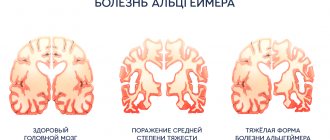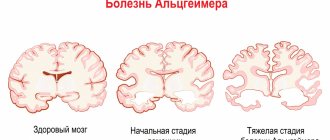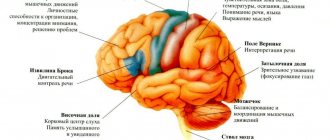- Causes of Alzheimer's development
- Stages of dementia
- How to Avoid Alzheimer's Disease
- Diet
- Correct lifestyle
- Control your risk factors
Alzheimer's syndrome is the most common type of dementia, which is a dangerous disease that leads to disruption of the central nervous system. This pathology affects older people. This is due to the fact that brain tissue atrophies and cognitive abilities are lost. To avoid the disease, prevention of Alzheimer's disease is required.
Causes of Alzheimer's development
The main reason for the appearance of pathology is the deposition of amyloid in brain cells. This protein substance disrupts neural connections, which provokes tissue death and changes in the composition of the brain fluid.
Deposits come in the form of:
- neurofibrillary tangles, which consist of insoluble tau protein, which disrupts normal brain function;
- amyloid plaques that form in the cells of the hippocampus and spread over time to the entire cerebral cortex, blocking the latter from performing its main function.
If the disease is diagnosed in a person under 65 years of age, then the main reason is genetic disposition. This form of the disease is diagnosed in 10% of patients.
Factors that provoke the development of Alzheimer's include:
- smoking;
- drinking alcohol;
- infectious diseases;
- drug use;
- nervous system disorders;
- diabetes at any stage of development;
- traumatic brain injuries;
- hypertension;
- diseases of the cardiovascular system.
Prevention
Doctors understand the process of development of this disease, but they have not been able to establish the exact cause of Alzheimer’s disease. Since Alzheimer's disease cannot be cured, it is better to prevent it. There are several ways you can protect yourself from encountering this disease. Firstly, it is recommended to give up bad habits and lead a healthy lifestyle. Secondly, it is recommended to improve your diet and eat more vegetables and fruits. And thirdly, it is recommended to exercise at least 2.5 hours a week. In addition, you definitely need to give your brain a workout. Research shows that people who are active in all areas of activity, that is, physically, mentally and socially, are much less likely to be diagnosed with Alzheimer's disease. In this regard, it is recommended:
- Read books and newspapers.
- Play musical instruments, learn foreign languages.
- Exercise.
- Solve crosswords.
- Take walks.
There is no evidence yet that educational computer games reduce the risk of developing this disease.
Stages of dementia
Doctors have identified 4 main stages in the development of the disease:
- Predementia. The patient does not assimilate the information received well; it becomes difficult for him to perform the simplest actions that previously did not cause any complications. At the same time, the patient’s abstract thinking is impaired; the person cannot plan anything.
- Early stage. At this stage of the progression of the disease, difficulties with speech arise, as well as pronounced memory impairment, the person finds it difficult to write, and becomes clumsy.
- Moderate stage. Long-term memory and coordination are impaired, and involuntary urination is noted. The patient forgets the way to home and the faces of his relatives.
- Difficult stage. The patient requires the help of other people, speech becomes so bad that the patient does not express certain phrases appropriately. Sometimes the speech apparatus completely fails. The person is in a state of apathy, as a rule, lies on the bed, stops eating and suddenly loses weight. Death occurs due to associated diseases.
Diagnostics
It is almost impossible to determine the development of Alzheimer's disease at the first visit to the clinic, since medicine does not know a way to detect this disease by conducting a conventional test. To make such a diagnosis, you will need to undergo a comprehensive examination. To look for signs and symptoms of Alzheimer's disease, you may need to have a blood test or a thinking test. The diagnosis of Alzheimer's disease is made based on:
- family medical history research,
- examinations by a neurologist
, - passing memory and thinking tests,
- blood tests to help rule out other possible diseases.
Early diagnosis of this disease is very important, as this gives a high chance of obtaining a positive effect from the prescribed treatment for Alzheimer's disease, which will significantly improve the quality of life.
- Opportunity to receive assistance from various government agencies.
- Ability to make a will and resolve many other legal issues.
- Opportunity to express your wishes regarding future accommodation.
How to Avoid Alzheimer's Disease
Timely prevention of the disease plays an important role in the patient’s quality of life. There are a number of ways to prevent Alzheimer's disease, the main thing is to adhere to the following rules.
Diet
Prevention of Alzheimer's disease is possible with proper nutrition. To avoid illness, you need to follow a special diet:
- Folic acid, which is found in vitamins B9, B12 and D, allows you to prolong youth and normal functioning of the brain, enriching it with the required nutrients, stimulating the formation of new and preservation of existing neural connections. By consuming the required dose, you can prolong your “sobriety of mind.”
- Take approximately 4-6 ml of vitamin E daily, which is also often called the “vitamin of youth.” Its main task is to remove toxic decomposition products from the body. A natural antioxidant is found in seeds, nuts, tomatoes, citrus fruits, bell peppers, and spinach. In consultation with your doctor, discuss your daily diet and, if necessary, add new sources of the vitamin.
You also need to undergo a full examination and consult with a nutritionist so that he can create the right menu that will provide the body with useful and necessary elements for the prevention of Alzheimer's.
Correct lifestyle
Since AD is not a viral infection (although herpes is one of the causes of the disease), but a degenerative disorder of the brain, Alzheimer's prevention should be carried out throughout life.
In addition to following doctors’ recommendations regarding diet, you need to pay attention to the preservation of cognitive functions of the brain. Choose activities that help increase your chances of staying in “your mind” for as long as possible:
- Engage in brain development. Crossword puzzles, puzzles, or board educational team games are suitable for this.
- Avoid head injury. That is, when playing sports, be sure to use protective equipment. The house must be in perfect order, especially when elderly people live in it. Get rid of sharp corners, replace old flights of stairs in a timely manner.
- Learn something new. The more the brain masters new knowledge, the longer the time it will remain healthy, the later age-related diseases will begin to appear. Moreover, the main role can be played not only by knowledge in its pure form (learning languages, fresh information about scientific achievements, memorizing poems, solving mathematical problems). Excellent results can also be achieved with the help of practical skills: playing checkers, mastering a musical instrument, putting together puzzles. Craft hobbies that require concentration and fine motor skills are also recommended.
- Balance control. This is an innate ability that reduces the number of injuries, especially in old age. Periodic yoga classes will improve your sense of balance, strengthen your muscular system, and learn to better control your body as a whole. In addition, these exercises calm you down and relieve stress.
- Work, try not to retire for as long as possible. Especially if the main profession involves mental work. While a person actively lives, doing his favorite job, the brain has to strain every day, it begins to function with maximum efficiency.
- Chat with different people. A hectic social life, especially in old age, has a positive effect on the state of the brain.
- Change your daily routine. Change the way to the store, read books in new genres, choose other places for walks.
Pay attention to the absence of stressful situations, daily comfortable night's rest, and mental state. Doctors will do everything in their power to avoid dementia, but you can delay the disease on your own.
Preventing dementia
Reducing the risk of developing Alzheimer's disease
Josh Mitteldorf, Preventing Dementia
Translation by Evgenia Ryabtseva, portal “Eternal Youth” For links, see the original article.
Dementia develops unexpectedly. People suffering from it feel like helpless hostages of their genes. However, this is a misconception. How much does the feared ApoE4 gene increase the risk of developing dementia? This cannot be determined using precise mathematical calculations, since this correlation depends on many lifestyle factors that are no less important than genetic characteristics. Women who inherit ApoE4 from one parent double their risk of developing Alzheimer's disease, but this effect can be easily modified by diet, exercise, and nutritional supplements. For men, the effect of one copy of ApoE4 is so small that it has virtually no effect on the level of risk. For women and men who have two copies of ApoE4, the risk of developing Alzheimer's disease is very high, but even then, factors within a person's control can significantly improve the situation.
Listed below are factors that, according to the author’s opinion based on an analysis of literary sources, can significantly reduce the risk of developing senile dementia even in the presence of a genetic predisposition.
1) physical activity (they are the most important);
2) mental stimulation and social factors;
3) metabolic syndrome/insulin sensitivity;
4) diet;
5) drugs and food additives that selectively affect the brain.
Physical exercise
At the beginning of the analysis, the author assumed that the most important factor would be No. 2 from the list above. For longevity, social contacts are more important than anything else, so we can assume that this pattern is even more relevant for maintaining brain health in old age.
However, unexpectedly, mental stimulation and social factors were found to be effective in some studies but not in others. Factor No. 1 turned out to be the undisputed leader in the processing of literary sources.
There is strong evidence that exercise reduces the risk of developing dementia. The most revealing are the meta-analysis published in 2011 and the review of literature published in 2021. A moderate amount of physical activity is much better than lying on the couch. Regular visits to the gym are even better, but the severity of the positive effect is not proportional to the increase in the intensity of the load.
Social relationships and mental stimulation
The most convincing study that identified a relationship between social factors and slowing cognitive decline was conducted in 2001. A team of scientists from the University of California at Los Angeles followed 1,200 women and men for more than 7.5 years and concluded that the most important social factor was “emotional support.”
However, subsequent studies have not confirmed the importance of emotional support. In the 2010 review, no social variables were listed as protective factors. And a 2016 study found that there was a relationship between social connections and baseline levels of cognitive function in midlife, and no relationship between changes in cognitive functioning over a 20-year period.
Diet
Of the several diets that have been tested for neuroprotection, the best described is the MIND (Mediterranean-DASH Intervention for Neurodegenerative Delay diet), developed by Martha Morris of Rush University in Chicago. According to Morris, this diet reduces the risk of developing Alzheimer's disease by 50%. The MIND diet is a variant of the Mediterranean diet (the letter M in the name is taken from the English word Mediterranean - Mediterranean). The main components of the Mediterranean diet are leafy greens, berries, nuts, fruits, vegetables, olive oil, whole grains and fish as a source of protein and omega-3 fatty acids. The MIND option focuses on blueberries and walnuts, which are supposed to be particularly beneficial for the brain. [For more information, visit WebMD.]
Regular coffee consumption is associated with a modest increase in risk, but tea, especially green tea, has a much better reputation. A Japanese study demonstrated a significant positive effect on cognitive function from drinking large amounts of green tea. Caffeine appears to have moderate neuroprotective effects, but most of the benefits of tea are due to the catechins or polyphenols found in decaffeinated tea. Green tea is a component of the MIND diet.
Metabolic syndrome
An association between metabolic syndrome and Alzheimer's disease was first identified 20 years ago. Observations showed that insulin therapy exacerbated the risk, and indeed, excess insulin appears to be a key factor in this association. Metformin is a standard treatment for diabetes, and one study showed that taking metformin reduced the risk of developing Alzheimer's disease in people with diabetes to levels comparable to those of the same age without diabetes. However, another study found that metformin actually increases the risk of developing Alzheimer's disease. A fairly compelling hypothesis is that metformin depletes vitamin B12 stores. This vitamin is essential for the functioning of neurons and is therefore concentrated in brain tissue. Many people suffer from B12 deficiency even without taking medications, so metformin should always be used in combination with B12. Whether there is a residual risk of developing Alzheimer's disease from metformin even with B12 remains to be seen, but it may be that B12 should not only be prescribed to patients taking metformin. Low protein diets protect against many aspects of aging and the MIND diet is also predominantly vegetarian. B12 is an important compound that can be obtained from plant foods.
Medicines, hormones and nutritional supplements
The most common pharmaceutical approach is to increase the concentration of the neurotransmitter acetylcholine. Acetylcholine is found wherever there are nerves and is essential for cognitive function, sensation, motor control, and especially memory. Alpha-glycerylphosphorylcholine is a precursor to acetylcholine that can be taken orally. A study was conducted in which 132 patients with Alzheimer's disease who took a drug of this compound showed improvement in symptoms after 90 and 180 days from the onset of the disease, compared with the deterioration observed in patients in the placebo group. However, it is not yet clear exactly what effect alpha-glycerylphosphorylcholine has: nootropic or neuroprotective. A bibliography on this subject can be found at Examine.com.
Another potential anti-aging agent is the angiotensin receptor blocker class of drugs. The most famous of them is losartan. There is scientific evidence that taking drugs in this class reduces the risk of developing Alzheimer's disease by 25%, and in experiments on mice they have demonstrated the ability to increase life expectancy. The mechanism of action of these drugs is to relax the walls of the arteries and lower blood pressure, which weakens the severity of the processes leading to the development of all diseases of the cardiovascular system. However, people do not like to take these drugs, since taking them is often accompanied by apathy and weakness. Some patients develop a cough. Telmisartan has the least number of unwanted side effects among drugs in this class.
Both male and female sex hormones have a protective effect against dementia. A moderate way to use this effect without taking sex hormones is to take dehydroepiandrosterone. Levels of this hormone decrease with age, and its serum levels are lower in patients with Alzheimer's disease, which suggests a possible beneficial effect of the drug, but does not prove it.
Pregnenolone is another hormone precursor; in fact, the body synthesizes dehydroepiandrosterone from pregnenolone. Its concentration in the body also decreases with aging. Studies in mice have shown that pregnenolone improves memory retention in a feedforward model. However, evidence for its neuroprotective effect is lacking.
Poor sleep quality, sleeping more than 8 or less than 7 hours a night, and sleep apnea are risk factors for dementia. Their effect is large, but there is little data on this issue. In Alzheimer's disease, sleep is typically disrupted, with melatonin levels reduced and out of sync with the circadian cycle. It is natural to come to mind to test the effectiveness of melatonin-containing nutritional supplements, and there is already evidence of limited success with melatonin in the treatment of Alzheimer's disease. No data could be found on the possible preventative effects of melatonin, but the use of alternative pharmaceutical sleep aids is associated with an increased risk of developing the disease.
"Encouragement Award"
The dietary supplements listed below are believed to have neuroprotective or nootropic effects, or a combination of both.
Mainly nootropic effect
- Bacopa
- Gingko biloba
- Ginseng
- Gotu kola (Centella asiatica)
- Huperzine
- Piracetam
- Lion's mane mushroom (crested hedgehog)
Mainly neuroprotective
- Acetyl-L-carnitine
- Ashwagandha
- Black cumin
- Curcumin
- Ginger
- Omega-3 fatty acids
- Alpha lipoic acid
Hope for the Twice Unlucky
One in 50 people has 2 copies of the ApoE4 gene. Their age-adjusted risk of developing dementia is more than 10 times higher, regardless of gender. There is a theory that keeping your blood cholesterol levels low can eliminate this risk entirely. This theory is based on the results of mechanistic analysis and extrapolation of the strange fact that in Nigeria, while the occurrence of the ApoE4 gene is highest, there is no increase in the incidence of dementia. It has recently been suggested that carriers of the ApoE4 gene should eat more omega-3 fatty acids than other people.
In the author's opinion, the most significant study of Alzheimer's disease was conducted by Dale Bredesen of the Buck Institute, who applied highly personalized treatment protocols to 10 patients with Alzheimer's disease, which allowed for radical improvements in the level of cognitive function in 9 out of 10 participants. This impressive example demonstrates the power of medical science when bureaucratic barriers are removed and doctors are given sufficient time to work individually with patients.
In this case, Breseden's work offers promising hope that the beneficial effects of the approaches described above are cumulative and that carefully selected individual programs that include them can delay the development of Alzheimer's disease for many years.
Risk factors
Article on the topic
An active lifestyle, studying and dancing will help you avoid dementia in old age.
The mechanisms of Alzheimer's disease are not yet known. According to one version, familial forms of this disease are caused by gene mutations. Diagnosis of the disease is carried out by DNA analysis, electroencephalography and computed tomography of the brain. And although these tests do not 100% confirm the disease, on their basis we can talk about the likelihood of the disease.
In addition to heredity, the list of risk factors for developing the disease includes age, environment, lifestyle and concomitant diseases, in particular high cholesterol, type 2 diabetes, high blood pressure and heart disease.
Note that you can develop dementia as early as thirty years of age, but such an early onset of Alzheimer's disease is rare.
Treatment
Many laboratories around the world are working on creating a vaccine against Alzheimer's disease. Scientists are also developing drugs that mobilize the remnants of neurons, which will lead to an improvement in the patient’s condition.
Article on the topic
Alzheimer's disease: how to organize a patient's life
But it is not yet possible to revive brain cells that have already degenerated. Scientists have high hopes for stem cell therapy.
In addition, domestic scientists have previously found that some allergy medications have neuroprotective properties, that is, they protect brain cells from the destructive processes caused by Alzheimer's disease. After clinical trials, it turned out that the medicine inhibits the development of the disease and restores some lost brain functions.
However, there is no method to completely cure Alzheimer's disease, and the disease is considered incurable. In the later stages of the disease, the basis of therapy becomes support and care for the patient.
Advantages of visiting our clinic
Our clinic employs highly qualified specialists who use the latest equipment for diagnosis. Our employees have extensive experience, which allows them to accurately diagnose and prescribe treatment for Alzheimer's disease. If you notice early signs of Alzheimer's disease in your relative, immediately seek help from specialists. Timely treatment will delay the development of Alzheimer's disease for 7-10 years, which will give the patient a dignified old age. Do not distance yourself from a sick relative, help him overcome his illness. You should always be there and support your loved one. Remember that once this person also dressed you and taught you to walk...










